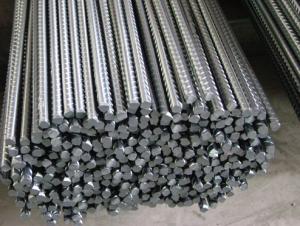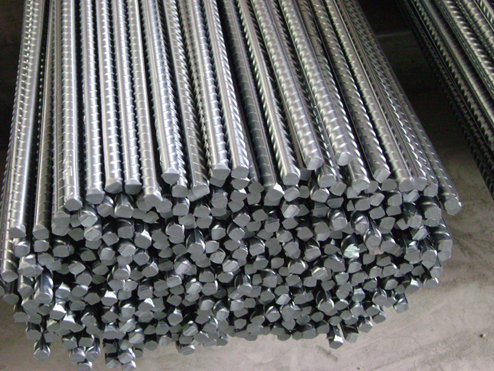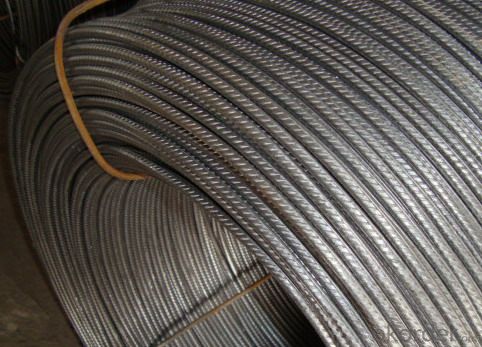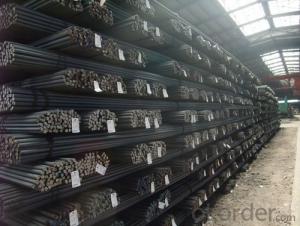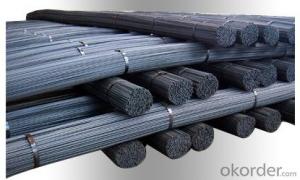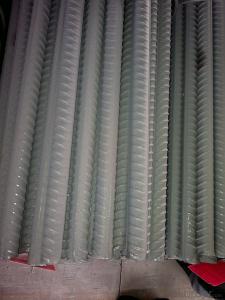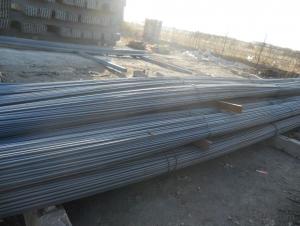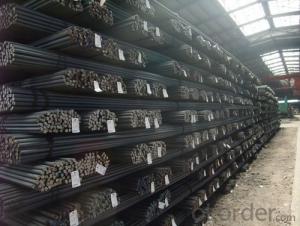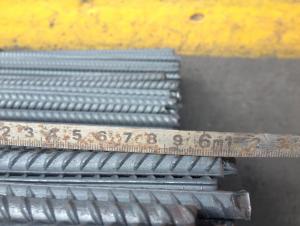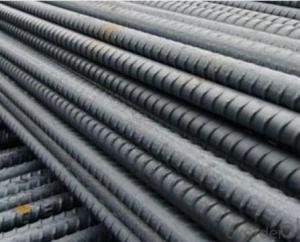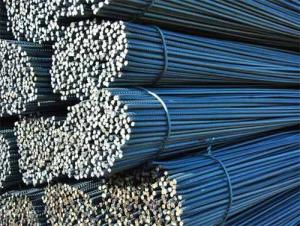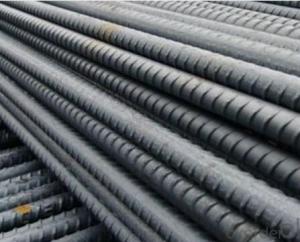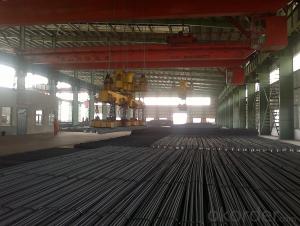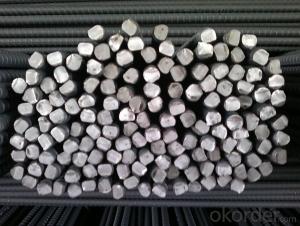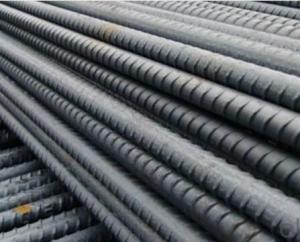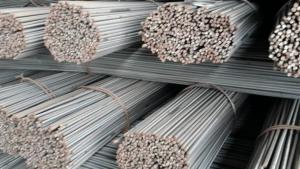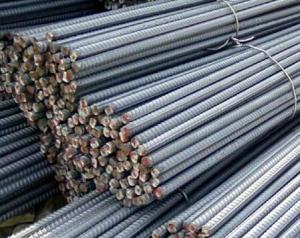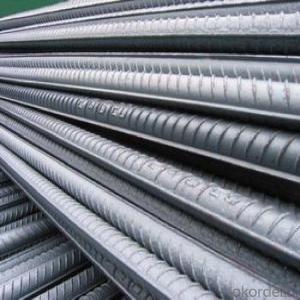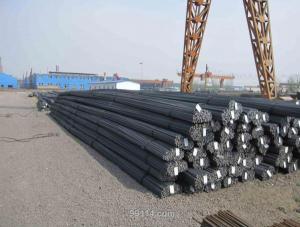Eight mm Cold Rolled Steel Rebars with High Quality
- Loading Port:
- Tianjin
- Payment Terms:
- TT or LC
- Min Order Qty:
- 50 m.t.
- Supply Capability:
- 15000 m.t./month
OKorder Service Pledge
OKorder Financial Service
You Might Also Like
1. Specifications of Eight mm Cold Rolled Steel Rebars with High Quality:
Name | Cold Rolled Steel Rebar | |
Diameter | 6mm,8mm,10mm,12mm,14mm,16mm,18mm,20mm, 22mm,25mm,28mm,32mm,36mm,40mm,50mm | |
Length | 6M, 9M,12M or as required | |
Price | Keep lower operating costs so as to offer competitive price for our clients | |
Label | to be specified by customer, generally, each bundle has 1-2 labels | |
Application | Building, construction | |
Invoicing | Actual or Theoretical Weight Basis as buyer’s request. | |
2. Theoretical weight and section area of each diameter of Eight mm Cold Rolled Steel Rebars with High Quality as below for your information:
Diameter(mm) | Section area (mm²) | Mass(kg/m) | Weight of 12m (kg) | Pcs/ton |
8 | 50.27 | 0.395 | 4.74 | 210.97 |
3. Packaging & Delivery of Eight mm Cold Rolled Steel Rebars with High Quality:
Packaging Detail: products are packed in bundle and then shipped by container or bulk vessel, deformed bar is usually naked strapping delivery, when storing, please pay attention to moisture proof. The performance of rust will produce adverse effect.
Each bundle weight: 2-3MT, or as required
Payment terms: TT payment in advance or Irrevocable LC at sight.
Trade terms :FOB, CFR, CIF
Delivery Detail: within 45 days after received advanced payment or LC.
4. FAQ:
Q1: Why buy Materials & Equipment from OKorder.com?
A1: All products offered byOKorder.com are carefully selected from China's most reliable manufacturing enterprises. Through its ISO certifications, OKorder.com adheres to the highest standards and a commitment to supply chain safety and customer satisfaction.
Q2: How do we guarantee the quality of our products?
A2: We have established an advanced quality management system which conducts strict quality tests at every step, from raw materials to the final product. At the same time, we provide extensive follow-up service assurances as required.
Q3: How soon can we receive the product after purchase?
A3: Within three days of placing an order, we will arrange production. The shipping date is dependent upon the quatity, how many sizes you want and the plan of production, but is typically 1 month to 2 month days from the beginning of production.
5. Images of Eight mm Cold Rolled Steel Rebars with High Quality:
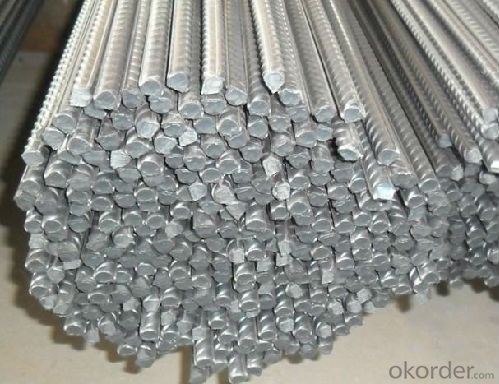
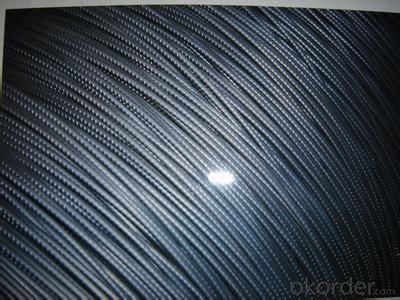
- Q: How do steel rebars affect the overall thermal stability of a structure?
- Steel rebars can significantly improve the overall thermal stability of a structure. Due to their high thermal conductivity, steel rebars help in dissipating heat more efficiently and evenly throughout the structure. This prevents the formation of localized hot spots and reduces the risk of thermal expansion, which can cause structural deformations and cracks. Additionally, steel rebars enhance the structural integrity of a building during fire incidents by providing necessary reinforcement and preventing sudden collapses.
- Q: What is the typical weight per meter of a steel rebar?
- The typical weight per meter of a steel rebar can vary depending on its size and grade. However, as a general guideline, a standard mild steel rebar with a diameter of 10 millimeters (mm) usually weighs around 0.616 kilograms per meter (kg/m). For larger sizes, such as a 20 mm rebar, the weight per meter can increase to approximately 2.47 kg/m. It is important to note that these values are approximate and may vary slightly depending on the specific manufacturing standards and regional regulations.
- Q: Can steel rebars be used in swimming pools and water tanks?
- Yes, steel rebars can be used in swimming pools and water tanks. Steel rebars provide strength and durability to the concrete structures, making them suitable for withstanding the weight of the water and any external pressures. However, it is essential to ensure proper corrosion protection measures are in place to prevent the rebars from rusting due to the constant exposure to water.
- Q: Are steel rebars resistant to chemicals?
- Yes, steel rebars are generally resistant to chemicals. The corrosion resistance properties of steel rebars make them suitable for use in various chemical environments. However, exposure to certain aggressive chemicals or environments may lead to corrosion over time, so it is essential to consider the specific conditions and choose the appropriate type of steel or protective coatings accordingly.
- Q: Can steel rebars be used in the construction of underground tunnels?
- Yes, steel rebars can be used in the construction of underground tunnels. Steel rebars are commonly used in tunnel construction to reinforce the concrete structures and provide additional strength and durability to withstand the underground conditions. The rebars are embedded within the concrete walls or floors of the tunnels, enhancing their structural integrity and ensuring the safety of the tunnel.
- Q: Can steel rebars be bent or shaped?
- Yes, steel rebars can be bent or shaped. Rebars are commonly used in construction to reinforce concrete structures, and they are often bent or shaped to fit the specific design requirements of the project. The bending or shaping of rebars can be done using various tools and techniques, such as manual bending, mechanical bending machines, or hydraulic presses. The ability to bend or shape steel rebars allows for the creation of complex and customized reinforcement patterns, ensuring that the concrete structure can withstand the intended loads and stresses.
- Q: Can steel rebars be used in aggressive chemical environments?
- No, steel rebars cannot be used in aggressive chemical environments as they are susceptible to corrosion and can easily deteriorate in such conditions.
- Q: How are steel rebars connected or joined together?
- Steel rebars are typically connected or joined together using different methods, depending on the specific application and structural requirements. The most common methods of connecting steel rebars are: 1. Overlapping: This method involves overlapping two rebars to create a continuous length of reinforcement. The overlapping length should meet the specified design requirements and is typically secured with steel tie wires or mechanical connectors. 2. Welding: Steel rebars can be joined together through welding, which involves melting the ends of the rebars and fusing them together using heat. Welding is a suitable method for connecting rebars in pre-fabricated structures or where high strength and durability are required. 3. Mechanical couplers: Mechanical couplers are pre-fabricated devices that provide a threaded connection between two rebars. These couplers are typically screwed onto the ends of the rebars, creating a strong and reliable connection. Mechanical couplers are commonly used in construction projects where fast installation and ease of use are important. 4. Lap splicing: Lap splicing involves connecting two rebars by overlapping them and securing the overlap with steel tie wires or mechanical connectors. This method is widely used in reinforced concrete structures and provides adequate strength and continuity. 5. Grouted splicing: In grouted splicing, the ends of two rebars are embedded into a sleeve or coupling filled with grout or epoxy resin. This method ensures a strong bond between the rebars, providing enhanced load transfer and corrosion resistance. It is important to note that the connection method used for steel rebars should comply with the applicable building codes and structural design specifications to ensure the overall integrity and safety of the structure.
- Q: What is the role of steel rebars in minimizing cracking due to shrinkage?
- The role of steel rebars in minimizing cracking due to shrinkage is to provide reinforcement and strength to concrete structures. By placing steel rebars within the concrete, they act as a framework that helps distribute the tensile forces caused by shrinkage. This prevents the concrete from cracking and ensures the overall stability and durability of the structure.
- Q: Can steel rebars be used in infrastructure projects?
- Yes, steel rebars can be commonly used in infrastructure projects. Steel rebars provide strength and durability to concrete structures, making them ideal for reinforcing various types of infrastructure such as bridges, buildings, highways, and tunnels. They help enhance the load-bearing capacity and structural integrity of these projects, ensuring their long-term stability and safety.
Send your message to us
Eight mm Cold Rolled Steel Rebars with High Quality
- Loading Port:
- Tianjin
- Payment Terms:
- TT or LC
- Min Order Qty:
- 50 m.t.
- Supply Capability:
- 15000 m.t./month
OKorder Service Pledge
OKorder Financial Service
Similar products
Hot products
Hot Searches
Related keywords
